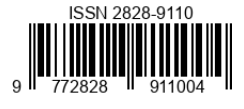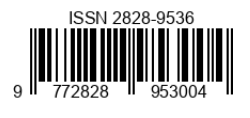The Impact of Destructive Fishing on the Development of Marine Tourism in Indonesia: A Case Study of Kapoposang Island, Pangkajene and Islands Regency, South Sulawesi Province, Indonesia
DOI:
https://doi.org/10.56910/nawasena.v4i1.1934Keywords:
Tourism, Destructive fishing, Marine ecotourism, Community participation, Marine ecosystemAbstract
As an archipelago, Indonesia has a vast ocean and is rich in biodiversity. With a vast ocean, Indonesia has considerable marine ecotourism potential. However, the problem that needs to be solved is destructive fishing in Indonesian waters. Destructive fishing can damage the marine ecosystem and reduce the number of marine life that characterizes Indonesian waters. Kapoposang Island is one of Indonesia's areas with great marine ecotourism potential. However, on Kapoposang Island, there are cases of destructive fishing which are feared to hurt the development of marine ecotourism. Besides that, community participation is needed so that an increase can follow the growth of marine ecotourism on Kapoposang Island in the standard of living of the local community, one of which is the economy. This study examined the relationship between destructive fishing and tourism development on Kapoposang Island. The research was conducted using a qualitative approach to analyze the impact of destructive fishing on the development of marine ecotourism on Kapoposang Island, Pangkajene Islands Regency, South Sulawesi. Researchers used data sources in the form of interviews and literature studies.
References
Adikampana, I. M. (2017). Pariwisata berbasis masyarakat. CAKRA PRESS.
Afrillia, D. (2022, March 15). Destructive fishing, cara penangkapan ikan yang merugikan ekosistem perairan. Good News From Indonesia. Retrieved from https://www.goodnewsfromindonesia.id/2022/03/15/destructive-fishing-cara-penangkapan-ikan-yang-merugikan-ekosistem-perairan
Arief, A. A. (2022). Social economic analysis of illegal fishing fishers in Spermonde Island. Jurnal IPTEKS PSP, 9(2), 59-75.
Arismiyanti, N. K. (2019). Development strategy of sustainable marine ecotourism in Indonesia. ASEAN Journal on Hospitality and Tourism, 15, 118-138.
Badan Pusat Statistik Kabupaten Pangkajene dan Kepulauan. (2021, February 24). Retrieved from Badan Pusat Statistik: https://pangkepkab.bps.go.id/id/statistics-table/2/NzkjMg==/jumlah-penduduk-menurut-kecamatan-dan-jenis-kelamin-kabupaten-pangkajene-dan-kepulauan--hasil-sensus-penduduk--jiwa-.html
BPSPL Makassar. (n.d.). Retrieved from Layar Phinisi: https://layarpinisi.id/sulsel/
Carneiro, M., & Martins, R. (2022). Destructive fishing practices and their impact on the marine ecosystem. ResearchGate, 1-11.
Kadir, A., & Santoso, B. (2024, July 27). FDC Unhas bentuk desa wisata bahari di Kapoposang Pangkep. ANTARA. Retrieved from https://www.antaranews.com/berita/4221059/fdc-unhas-bentuk-desa-wisata-bahari-di-kapoposang-pangkep
Kuba, A. (2024, August 11). Pemkab Pangkep luncurkan desa wisata Pulau Kapoposang, kolaborasi FDC FIKP Unhas. Herald Sulsel. Retrieved from https://sulsel.herald.id/2024/08/11/pemkab-pangkep-luncurkan-desa-wisata-pulau-kapoposang-kolaborasi-fdc-fikp-unhas/
Leo, O. N. (2020, May 11). Taman Wisata Perairan Kapoposang, 6 hal unik yang bisa dilakukan di Kapoposang. POS-KUPANG. Retrieved from https://kupang.tribunnews.com/2020/05/11/taman-wisata-perairan-kapoposang-6-hal-unik-yang-bisa-dilakukan-di-kapoposang?page=4
Nurdin, N., & Grydehøj, A. (2014). Informal governance through patron–client relationships and destructive fishing in Spermonde Archipelago, Indonesia. Journal of Marine and Island Cultures, 54-59.
Prakasa, Y., Sawu, M. R., & Ulinnuha, M. F. (2023). Opportunities and challenges in development community-based marine ecotourism on Samalona Island, Makassar City. Journal of Tourism Sustainability, 3(2), 94-100.
Pratama, A. (2024, April 25). Kapoposang, spot wisata bawah laut eksotis di Pangkep. IDN TIMES SULSEL. Retrieved from https://sulsel.idntimes.com/travel/destination/idn-times-hyperlocal/kapoposang-spot-wisata-bawah-laut-eksotis-di-pangkep
Purnama, A. O. (2021). Partisipasi masyarakat dalam pengembangan wisata bahari Pulau Kapoposang Kabupaten Pangkep Sulawesi Selatan. Culture & Society: Journal of Anthropological Research, 3(2), 113-126.
Redaksi. (2022, August 28). KKPN Kapoposang, kawasan konservasi perairan lestari dan membanggakan di Sulawesi Selatan. PELAKITA. Retrieved October 1, 2024, from https://pelakita.id/2022/08/28/kkpn-kapoposang-kawasan-konservasi-perairan-lestari-dan-membanggakan-di-sulawesi-selatan/#:~:text=Dalam%20prosesnya%2C%20TWP%20Kapoposang%20ditetapkan%20oleh%20Menteri%20Kelautan,Provinsi%20Sulawesi%20Selatan%2C%20pada% 20tan
Rombe, K. H., Rosalina, D., Rahmawati, G., Surachmat, A., Sabilah, A. A., Rahman, A., & Hermawan, R. (2023). Kondisi terumbu karang di Pulau Kapoposang Kecamatan Liukang Tuppabiring Kabupaten Pangkajene Provinsi Sulawesi Selatan. Jurnal Sumberdaya Akuatik Indopasifik, 7(4), 515-525.
Rosana, F. C., & Cahyani, D. R. (2020, October 2). KKP bekuk 8 nelayan, tangkap ikan pakai potassium. Tempo. Retrieved from https://bisnis.tempo.co/read/1392454/kkp-bekuk-8-nelayan-tangkap-ikan-pakai-potassium#:~:text=TEMPO.CO%2C%20Jakarta%20-%20Delapan%20orang%20yang%20diduga%20menangkap,dan%20Perikanan%20%28PSDKP%29%20KKP%20pada%2028-30%20September%202020.
Singh, A., & Easow, D. T. (2023). A systematic review on the benefits and challenges of maritime tourism. Journal of Advanced Zoology, 44(03), 725-745.
Sulaksana, I. G., Susianti, H. W., & Dianasari, D. A. (2023). Application of eco-tourism principles in the development of marine tourism in Sanur. Tourism Research Journal, 7(1), 98-109.
Thetsane, R. M. (2019). Local community participation in tourism development: The case of Katse villages in Lesotho. Athens Journal of Tourism, 6(2), 123-140.
Wardani, P. A., Rahmanita, M., Farhan, M., & Pramudita, R. F. (2023). Community participation in tourism destination development: Lesson from Kelor Tourism Village. JLCT, 1(2), 1-9.
Willer, D. F., Brian, J. I., Derrick, C. J., Hicks, M., Pacay, A., McCarthy, A. H., . . . Steadman, D. (2022). 'Destructive fishing'—A ubiquitously used but vague term? Usage and impacts across academic research, media and policy. Fish and Fisheries, 1039-1054.
Downloads
Published
How to Cite
Issue
Section
License
Copyright (c) 2025 Nawasena: Jurnal Ilmiah Pariwisata

This work is licensed under a Creative Commons Attribution-ShareAlike 4.0 International License.








